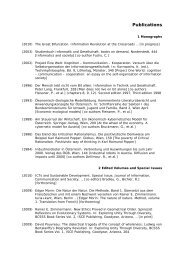CHRISTIAN FUCHS - ICT&S - Universität Salzburg
CHRISTIAN FUCHS - ICT&S - Universität Salzburg
CHRISTIAN FUCHS - ICT&S - Universität Salzburg
Create successful ePaper yourself
Turn your PDF publications into a flip-book with our unique Google optimized e-Paper software.
Christian Fuchs: Social Networking Sites and the Surveillance Societyplatform that was created by the Austrian Green Party at the time when the SecurityPolice Act was amended. “PLATTERWATCH documents the creation of the surveillancestate and the the dismantling of the constitutional state. We collect facts that range fromonline state surveillance by Trojans or the IMSI-catcher to the activities of the USHomeland Security within Austria. PLATTERWATCH accompanies the Interior Minister[Günther Platter (Austrian People’s Party ÖVP) was Austrian Interior Minister fromFebruary 28, 2003 until July 1, 2008. He was followed by Maria Fekter (ÖVP)]throughout Austria. We put the minister online” 36 .There are certainly limits of watchdog organizations and initiatives. They are generallycivil society projects because it is unlikely that big corporations or governments supportinitiatives that tend to criticize corporations and governments with big amounts ofmoney. Therefore such projects are frequently based on precarious, self-exploitativelabour, and are confronted with a lack of resources such as money, activists, time,infrastructure, influence, etc. If political or economic institutions offer support, thenthere is a danger that they try to influence the activities of such projects, which canseverely damage or limit the autonomy and critical facility of such projects. They seemto be trapped in an antagonism between resource precariousness and loss of autonomythat is caused by the fact that the control of resources is vital for having politicalinfluence in contemporary society and that resources in this very society are unequallydistributed so that corporations and established political actors have much more powerand influence than other actors. Given this situation, it would be a mistake not to try toorganize citizens’ initiatives, but one should bear in mind that due to the stratifiedcharacter of capitalism it is more likely that such initiatives will fail and remainunimportant than that they will be successful in achieving their goals.There are no easy solutions to the problem of civil rights limitations due to electronicsurveillance. More surveillance does not solve problems such as terrorism, but ratherbrings about a climate of permanent suspicion where citizens are always automaticallysuspect of being criminals. It is short-sighted and a technological-deterministic attitudeto think that more surveillance technology brings about more security and peace. Lawand order politics are superficial measures that ignore the underlying socio-economicand political causes of societal problems. Corporations have an economic interest insurveillance. If they gather data on consumers/users, they can sell these data toadvertising clients. As long as there is capitalism, there will be media corporations (suchas studiVZ, Facebook, MySpace, and others) that sell their audience as commodity toadvertising clients because they are necessarily driven by the logic of profitability. It isnot an accident that corporations like studiVZ, Facebook, or MySpace have introducedadvertising options such as personalized advertising that are based on the surveillanceof profiles and usage behaviour. It is also not an accident that one has to opt out of suchfeatures, and not has to opt in. Economic surveillance is profitable, therefore media36 “PLATTERWATCH dokumentiert den Aufbau des Überwachungsstaats und den Abbau des Rechtsstaats.Wir sammeln Facts vom Trojaner und vom IMSI-Catcher bis zur amerikanischen Homeland Securitymitten in Österreich. PLATTERWATCH begleitet den Innenminister: mit Fotoapparat und Kamera, querdurch Österreich. Wir stellen den Minister online“ (http://www.platterwatch.at, accessed on December8, 2008).105









